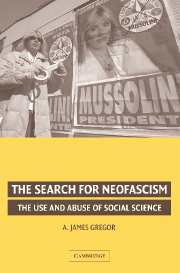Book contents
- Frontmatter
- Contents
- Preface
- Acknowledgments
- 1 The Decay of an Enterprise
- 2 Fascism
- 3 Neofascism: Some Presumptive Candidates
- 4 Julius Evola, Fascism, and Neofascism
- 5 Black Nationalism and Neofascism: Marcus Garvey and the Universal Negro Improvement Association
- 6 Black Nationalism and Neofascism: Elijah Muhammad and the Lost-Found Nation of Islam
- 7 Islamofascism: Neofascism in the Middle East
- 8 Hindutva: The Case for a Saffron Fascism
- 9 Post-Maoist China: Fascism with Chinese Characteristics
- 10 Conclusions
- Index
3 - Neofascism: Some Presumptive Candidates
Published online by Cambridge University Press: 05 June 2012
- Frontmatter
- Contents
- Preface
- Acknowledgments
- 1 The Decay of an Enterprise
- 2 Fascism
- 3 Neofascism: Some Presumptive Candidates
- 4 Julius Evola, Fascism, and Neofascism
- 5 Black Nationalism and Neofascism: Marcus Garvey and the Universal Negro Improvement Association
- 6 Black Nationalism and Neofascism: Elijah Muhammad and the Lost-Found Nation of Islam
- 7 Islamofascism: Neofascism in the Middle East
- 8 Hindutva: The Case for a Saffron Fascism
- 9 Post-Maoist China: Fascism with Chinese Characteristics
- 10 Conclusions
- Index
Summary
As has been suggested, in the years immediately following the end of the Second World War, lay persons, journalists, and academics began to speak of “neofascism” to identify those small groups of individuals, formerly National Socialists or Fascists, who had survived the carnage of the conflict and who continued to identify, in some sense or other, with their past loyalties. Given the propaganda conveniences afforded by the practice, we have seen that it had become standard, in the course of the Second World War, simply to refer to both National Socialist Germany and Fascist Italy as “fascist.” The manifest differences between the two movements and regimes notwithstanding, the practice continued after the war. As a result, in the years immediately following the Second World War, any individuals and their political activities that could be directly or indirectly associated with either Hitler's Germany or Mussolini's Italy were spoken of as representing a generic “neofascism” – a characterization that generally meant little more than that the individuals and/or groups involved showed some real or presumed sympathy for the Nazism and/or Fascism of their respective nation's past. In general, the term was applied to such individuals and the disjointed, fragmentary and transient associations in which they collected themselves. Little concern was devoted to the coherence, integrity, or fascist quality of their individual or collective belief systems. They were all simply neofascists, indelibly identified by their individual histories and connected by the most casual of associations.
- Type
- Chapter
- Information
- The Search for NeofascismThe Use and Abuse of Social Science, pp. 54 - 82Publisher: Cambridge University PressPrint publication year: 2006



